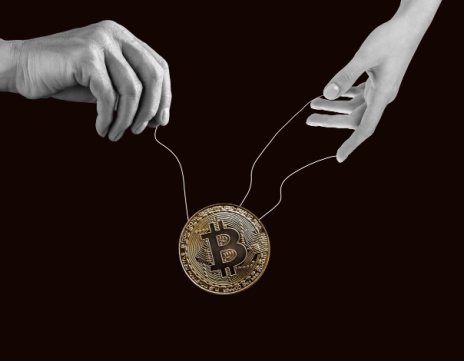Follow us on:
Follow us on:
Follow us on:
Kitco News
Share this article:
Editor’s Note: With so much market volatility, stay on top of daily news! Get caught up in minutes with our speedy summary of today’s must-read news and expert opinions. Sign up here!
(Kitco News) – Unregulated crypto exchanges, where the overwhelming majority of crypto trades are done, systematically engage in wash trading to boost profits and inflate volumes, according to a new study from researchers at the U.S. National Bureau of Economic Research.
In the ‘Crypto Wash Trading’ working paper, authors Lin William Cong, Xi Li, Ke Tang and Yang Yang analyzed cryptocurrency transaction information in the TokenInsight database from 29 major exchanges, including Binance, Coinbase, and Huobi, as well as lesser-known exchanges from Jul. 9 to Nov. 3, 2019 for evidence of wash trading.
The authors define wash trading as “investors simultaneously selling and buying the same financial assets to create artificial activity in the marketplace,” which distorts price, volume, and volatility, and impacts investors’ confidence and participation in financial markets.
The exchanges were chosen based on their rank on third-party websites, representativeness, and API compatibility, and they were sorted into Tier-1 (ranked in the top 700 in the finance/investment section of SimilarWeb.com and Tier-2 (all ranked outside the top 960). The authors focused on trades of Bitcoin (BTC), Ethereum (ETH), Litecoin (LTC), and Ripple (XRP), the four most heavily traded cryptocurrencies against U.S. dollars at the time.
In order to detect wash trading patterns, the authors employed “multiple approaches” which are not likely to be affected by “dispersed traders’ strategies, exchange characteristics, or specificities of the asset class.”
“Our first key finding is that wash trading broadly exists on unregulated exchanges but is absent on regulated exchanges,” they wrote. “We consistently find anomalous trading patterns only on unregulated exchanges, with Tier-1 exchanges failing more than 20% of the tests and Tier-2 exchanges failing more than 60%.”
In addition to identifying which exchanges regularly engaged in wash trading, the authors also quantified how much of the total trading volume wash trading represented on each exchange.
“We find that the wash trading volume, on average, is as high as 77.5% of the total trading volume on unregulated exchanges, with a median of 79.1%,” they wrote. “In particular, wash trades on the twelve Tier-2 exchanges are estimated to be more than 80% of the total trade volume, which is still over 70% after accounting for observable exchange heterogeneity.”
The authors wrote that these percentages represent over $4.5 trillion in wash trading in spot markets and over $1.5 trillion in derivatives markets in Q1 2020 alone.
They also measured the impact of wash trading on an exchange’s ranking. Using historical ranking and trading volume information from CoinMarketCap, the authors showed that exchanges whose total reported volume was 70% wash trading moved up by 46 positions in rankings.
They also found that an exchange’s wash trading correlates positively with its listed cryptocurrency prices over the short term, and that longer-established exchanges with more users do less wash trading, while less prominent exchanges “have short-term incentives for wash trading without drawing too much attention.” They added that wash trading is positively predicted by returns and negatively predicted by price volatility.
The authors noted that they saw very little evidence of wash trading on regulated exchanges. “While current business incentives and ranking systems fuel the rampant wash trading on unregulated exchanges, the regulated exchanges, having committed considerable resources towards compliance and license acquisition and facing severe punishments for market manipulation, do little wash trading,” they wrote.
They conclude that this study provides “a cautionary tale to regulators around the globe” and underlines the importance of regulation in emerging industries, the importance of adjusting volumes to account for wash trading in other studies, and “the utility of statistical tools and behavioral benchmarks for forensic finance and fraud detection.”
For Kitco News
Interactive Chart
Kitco
Connect
Tools
We appreciate your feedback.
How can we help you? 1 877 775-4826
Drop us a line info@kitco.com

